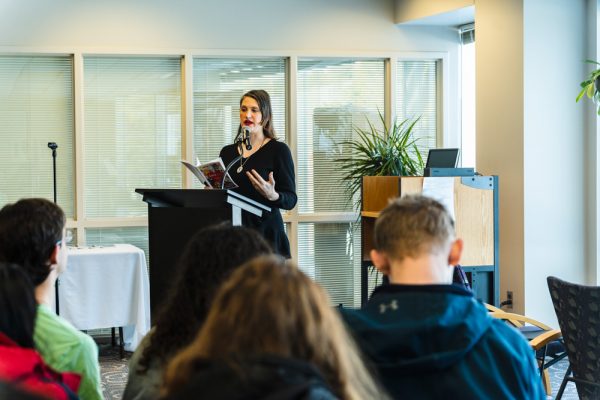
Nina Buckless recites an original poem at the “Lovesick” release party and open mic event. Torrence Williams | Washtenaw Voice
By Kyndall Flowers
Contributor
About 50 students gathered in the Bailey Library on Feb. 11 to celebrate the release of “Lovesick,” an anthology published by the WCC poetry club. Chocolates and love poems brought the spirit of Valentine’s Day to the open mic.
Famous love poems printed on colored pieces of paper floated around the room for attendees to read aloud if they had none of their own work to share, and ambient tunes provided by the WCC audio club played throughout the event.
In between readings, Tom Zimmerman, the host and the editor of “Lovesick,” interjected with especially poignant quotes, like “At the touch of love everyone becomes a poet,” by Plato and “Everybody said ‘follow your heart.’ I did, and it got broken,” by Agatha Christie.
Zimmerman, who serves as the poetry club adviser, said the audience turnout at the “Lovesick” release was particularly high compared to previous poetry events he’s hosted. He said the poetry club also received more poetry submissions for the anthology than usual, citing the theme as an extra draw.
“I think the theme of love, and then ‘lovesick’ adds an element of ambiguity about it,” Zimmerman said. “That way not everything has to be sappy and syrupy; it’s mostly about the ambiguities, or sometimes even pain of love that I think we can all relate to a little bit.”
While a lot of the poems read were explicitly love poems, open mic performer Nina Buckless’ “A Dream without Loneliness,” took a critical look at the role of women in history, literature and art.
“If Leda had an abortion, perhaps there never would have been a war that launched thousands of ships and Homer might not have had much to say about that day,” Buckless said in her poem, which is featured in the anthology.
“The woman is blamed,” Buckless said of the poem during an interview with the Voice. “Helen is blamed as the reason for the war, when really there are other reasons… but the story is always told in the way that Helen is blamed.”
Buckless explained the origin of her inspiration for her poem and how it fit into the “lovesick” theme of the anthology.
“I was thinking about this question of lovesickness. Not lovesickness in the sense of yearning and longing to be with a lover, but lovesickness as a question of how lust and desire and control and power corrupt the human mind, and especially males’ mind, and how those individuals take that control, anger, hatred out on women,” Buckless said.


